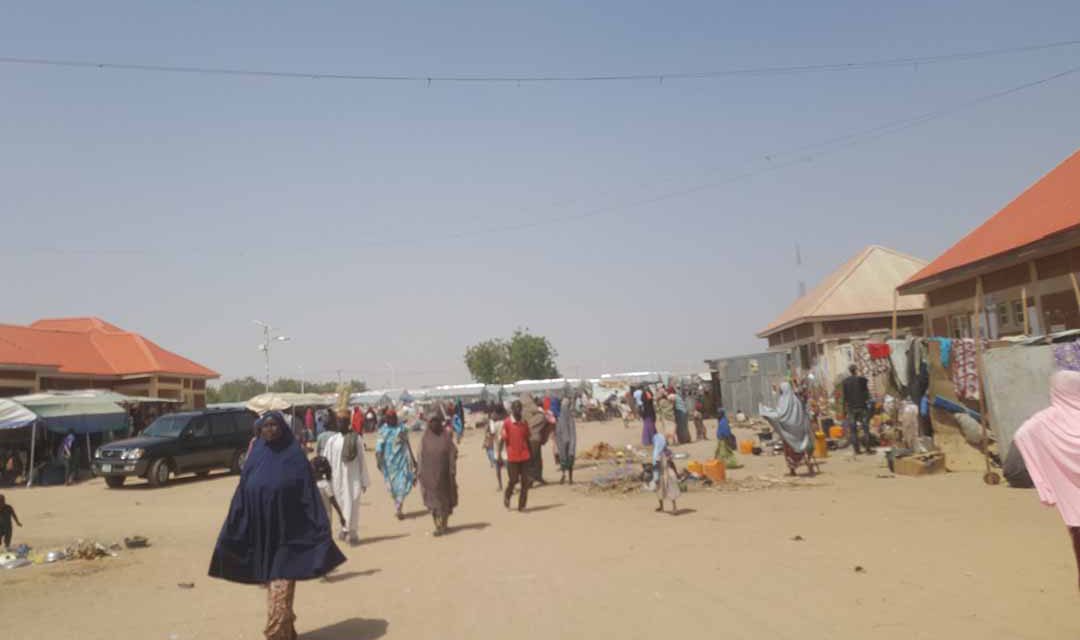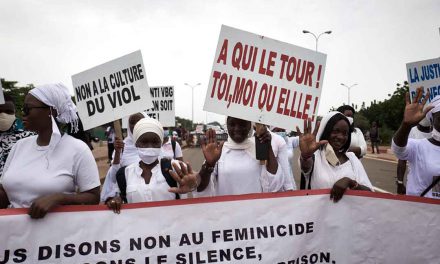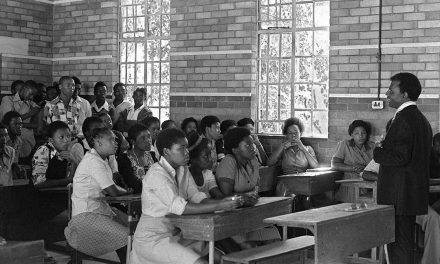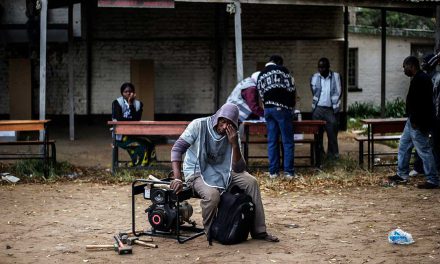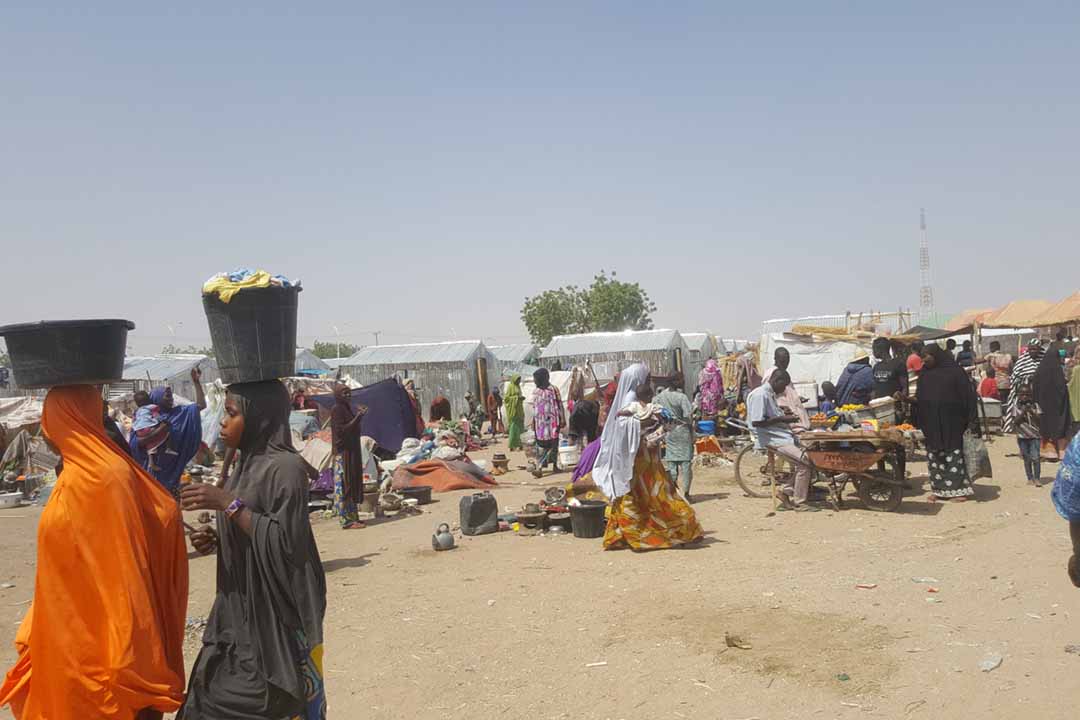
People displaced by Boko Haram conduct their daily businesses at a government-run camp in the Bulunkutu area of Maiduguri, Borno state, north east Nigeria, February 2019 (Photo by INI EKOUTT)
Boko Haram: fight or talk?
Last year, the Nigerian military persistently denied media reports of an upsurge in attacks by Boko Haram in the country’s northeast. Then, in November 2018, the Islamist militant group raided an army base near the border with Niger and Chad and killed over 100 soldiers, according to Reuters news agency. The army admitted the attack in the town of Metele, but said the death toll was 23. But even that relatively lower figure represented a devastating turn for the Nigerian military.
Three years earlier, it had put the group on the back foot under the new government of Muhammadu Buhari, a former army general who came to power on a promise to defeat Boko Haram. Those early wins allowed the Buhari government to feel upbeat about rescuing hundreds of abducted schoolgirls and ending the conflict through negotiation. By 2016, the new president was urging the United Nations (UN) to mediate and offering to “bend over backwards” to solve the crisis. The talks that followed led to the release of 103 schoolgirls, but further negotiations failed. Over 100 of the girls kidnapped in 2014 from Chibok town amid global outrage remain missing.
Many analysts have linked the partial success in the negotiations to the recent rise in attacks on military targets, pointing at the huge payments the group received as ransom and the release of its commanders in exchange for the schoolgirls. “Going into negotiation with terrorists gives [them] a psychological sense of control over the authority, and somewhat legitimises their activities,” said Anietie Umoren, a psychologist and researcher at the Obafemi Awolowo University, Ile Ife, Nigeria.
Indeed, critics argue that the group has used the resources to regroup. With attacks persisting and the military response not as effective, such ironic outcomes raise the question of how the Nigerian government can best engage the group and end the crisis.
Only a few countries admit negotiating with extremists. Most western countries, for example, adopt a “no negotiation with terrorists” policy, especially with regards to the payment of ransom. Countries such as the United States, the United Kingdom and Israel maintain this policy, but do sometimes negotiate secretly, according to Alan Steinberg in a 2015 paper in the Journal of Peace, Conflict and Development. On the other hand, France, Italy, Germany and Switzerland are more open to negotiation, according to various reports. The successful Nigeria negotiation for the abducted girls was mediated by the Swiss government.
For decades, many policymakers feared that negotiating with extremists would weaken governments, legitimise extremism and incite violence, but some recent studies have countered that claim. Ostracising extremists may do more harm than good, argues Harmonie Toros, an expert on conflict resolution, in a 2008 research paper. Rather, a preparedness to engage in dialogue with extremists could help resolve conflicts. “Negotiations also enable groups to voice their grievances and strengthen factions interested in non-violent solutions,” she writes. “In contrast, naming groups as terrorists with the intention of delegitimising them can radicalise such groups and curtail attempts to resolve conflicts non-violently.”
Nigeria’s experience with extremism dates back decades, but it was the advent of Boko Haram that required the Nigerian government to formulate some form of official position on negotiating with radical groups. The jihadist sect, which emerged a decade ago, has now become one of the world’s most brutal extremist groups. Its activities have left over 30,000 people dead and more than 1.6 million people displaced, according to the UN’s 2018 Nigeria National Human Development report.
While the Nigerian government does sometimes admit to engaging in negotiations with Boko Haram, it denies paying ransoms. In 2016, Information Minister Lai Mohammed acknowledged the negotiation to free the Chibok girls succeeded after the mediation of the Swiss government and the International Red Cross, but denied that a ransom was paid. However, the Wall Street Journal and the BBC reported that between two and three million euros were paid to the group and also that some of its top leaders had been released.
That approach showed early signs of trouble. By March 2017, a Boko Haram propaganda video showed a man clutching an AK 47, claiming to be one of five commanders freed and threatening fresh attacks. The group, which has split into two factions, soon intensified its attacks in 2018, killing hundreds of soldiers and civilians. Security analysts point to several reasons for the new attacks, among them poor military strategy, demoralised troops and poor equipment. They also traced the problem to the government’s negotiation model, which funnelled millions of dollars to the militants and freed their skilled fighters, allowing the group to rebuild its arsenal and manpower.
The recent uptick in attacks by Boko Haram, also known as Islamic State in West Africa (ISWAP) in recognition of the group’s allegiance to the terror group ISIL, has three main causes, according to Cheta Nwanze of the Abuja-based SBM Intelligence. “The funding received by Boko Haram from the federal government came with the added benefit of experienced commanders being returned,” he told Africa in Fact. In addition, the security forces were increasingly attending to threats elsewhere, including clashes between herders and farmers in the central region and deadly attacks on villagers by bandits in the northwest. The government’s attention was further distracted by the looming general election in February this year. Moreover, Boko Haram was marking the 10th anniversary of the death of its founder, Mohammed Yusuf.
In March last year, Information Minister Lai Mohammed said the government was negotiating a possible ceasefire and an end to the conflict. But after the Melete army base attack and other similar raids, the government appeared reluctant to negotiate and pay ransoms. It gave a hint of this in August 2018 after the sect abducted three female aid workers and demanded a huge amount of money for their return, according to government insiders. The government rebuffed the threat and the militants murdered two of the workers in response.
President Buhari, who was at the time of writing seeking a second term in the February elections, has not stated clearly what, if any, non-military approaches he may apply in dealing with the crisis if re-elected. The government would, however, “consolidate on [Buhari’s] first-term achievements”, according to the campaign manifesto of the ruling party, the All Progressives Congress.
Meanwhile, Buhari’s main challenger in the election, former Vice President Atiku Abubakar, says he will use “diplomacy, intelligence and border controls” in tackling the problem. Taunting the Buhari administration for its prisoner swap policy, Abubakar added that he would not release captured Boko Haram fighters back into society. “It makes no military or practical sense to release hardened terrorists, who have taken the precious lives of members of the Nigerian Armed Forces, on the flimsy excuse that they have been deradicalised or are repentant,” Abubakar said on 12 January, according to the News Agency of Nigeria (NAN).
Analysts say the crisis may ultimately not be resolved militarily. Any negotiations, however, must be done from a position of strength, they warn. “You cannot rule [negotiations] out, but … you don’t negotiate from a position of weakness, which is where we are now,” Chidi Odinkalu, a lawyer and former head of Nigeria’s Human Rights Commission, told Africa in Fact.
The United States Institute of Peace, an American federal institution that promotes conflict resolution worldwide, says negotiations with extremists can help governments to gain intelligence and influence, and so ultimately contribute to ending conflict involving extremists. “The greatest benefit of engagement is to end the conflict, or at least its terrorist form. If the terrorists can agree to stop violent acts, the state can reciprocate by softening its ‘no engagement’ stance. This initial exchange can lead to further exchanges,” it says on an undated page of its website, Engaging Extremists.
The fact that a split has recently emerged within the group may, however, make talks more difficult. One faction is led by the better-known Abubakar Shekau – a former deputy of the group’s founder, Mohammed Yusuf – who has been reported killed several times, only to re-emerge as apparently alive and well. The other faction is led by Abu Musab al-Barnawi, a son of Yusuf’s, who acted as the spokesperson of Boko Haram before it split in 2016. Shekau has repeatedly turned down previous attempts at negotiation, while al-Barnawi has been open to dialogue. In 2016, President Buhari admitted that the split had made it difficult to find credible leaders with whom to negotiate.
“We have to find a way to draw the more pliable faction into local politics, in a manner that is not hostile to the Nigerian state and its citizens,” says SBM’s Nwanze. “This is because [the extremist group] is increasingly gaining acceptance among some locals as an alternate government.”
One community where such an alternate government may operate is the fishing town of Baga in Borno state, where the militants launched a deadly attack in December 2018. The army, which initially denied the group had taken control of the town as widely reported in the media, later announced it had recaptured it. Weeks after that claim, residents said Boko Haram militants remained in control of Baga, and were issuing “movement permits” that allowed residents to move in and out of the town, the newspaper Premium Times said in a 5 February report.
Negotiating with a Boko Haram faction that operates as an alternate government raises the fear that the Nigerian government is flirting with a threat to its legitimacy, or even the possibility of a secession, if it allows the group to consolidate its gains. Whether it decides to do so will be determined by a range of factors, including whether Buhari successfully retains the presidency. In the meanwhile, though, Nigeria’s approach to engaging with the extremists looks more like dithering than purposeful, considered action.
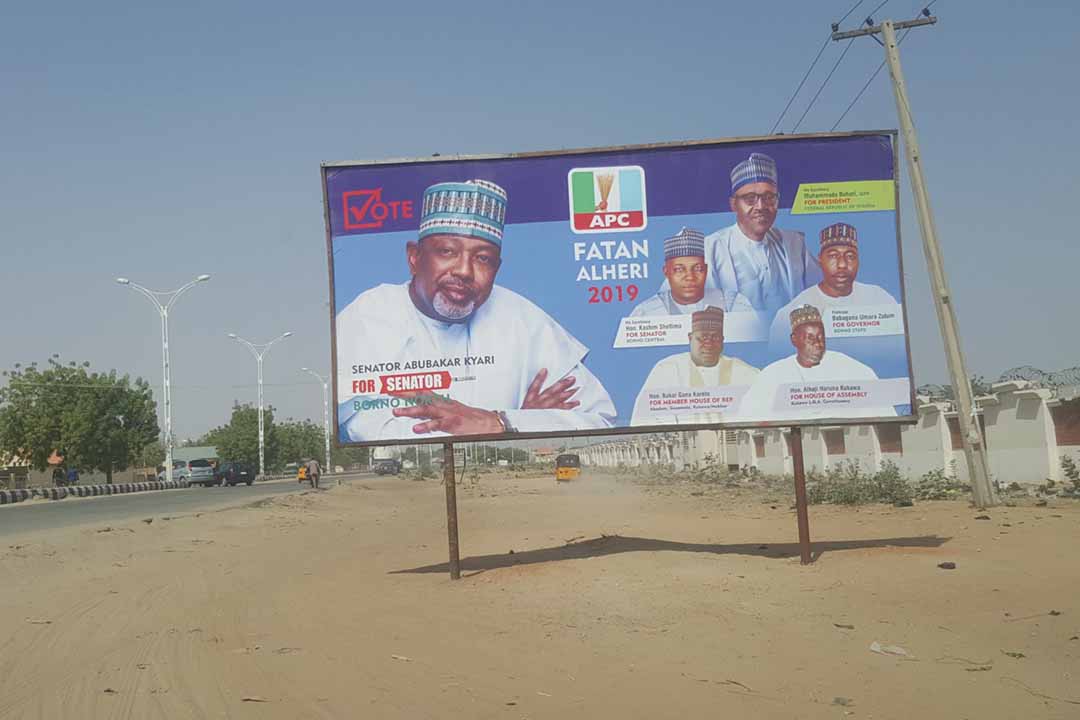
A billboard in Maidugari, Borno state, the birthplace of Boko Haram, shows Nigeria’s President Muhammadu Buhari and other politicians ahead of recent general elections. Political leaders will play roles in deciding on possible talks with the deadly Islamist group. February 2019 (Photo by INI EKOTT)
Ini Ekott is the deputy managing editor at Premium Times, Nigeria. He has researched and written extensively on governance and leadership in Africa. He is a former Wole Soyinka investigative reporter of the year, and was a member of the global team of journalists that conducted the Pulitzer-winning Panama Papers reporting

